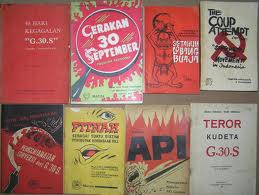I write this blog from Indonesia. Reviewing the past year, poet and journalist Goenawan Mohamad called 2012 the year of remembering. The resonance with 1965 is deliberate. It harks back to what the Australian novelist Christopher Koch dubbed the year of living dangerously. Koch borrowed that term from Indonesia’s first president, Sukarno, who was actually describing the year before, 1964, when Indonesian politics were in turmoil. The ferment spilled over, culminating in an attempted coup on 30 September 1965 and an ensuing massacre of at least 200,000 Indonesians caught up in a frenzy of (ostensible) anti-communist bloodletting.
For thirty or so years that September day known as Gestapu – the acronym for the Movement of the 30 September, aimed at removing generals accused of plotting to overthrow Sukarno — was swathed in mystery. Rumours about the massacre were persistent, sometimes exaggerated, often ill-informed by other prejudice especially against Chinese Indonesians. How many died at whose hand was a matter of speculation. Most perpetrators were not brought to justice. Surviving members of the Communist Party of Indonesia (PKI) and their families led tainted lives. Those in jail faced the death penalty, waiting to hear each Independence Day if they were to be pardoned or granted another reprieve from execution. Others faced exile and discrimination.
Then came the reform period, the fifteen years since the fall of Soeharto (the major beneficiary of the failed coup), when the scabs have been picked at and attempts made to heal deep wounds. These culminated in the year of remembering. (Of course, many outside Indonesia notably Robert Cribb, an historian at the ANU, had already done much to shed light on the facts of 1965 and its aftermath.) What makes 2012 special is that the examination of the past has now reached well beyond academics and the people directly affected. 1965 is no longer taboo. Those who have felt stigmatised by Soeharto’s New Order interpretation of history are having their memories placed on the record; and a new generation of writers is retelling the Gestapu story, some in fiction, others by way of documentary film and journalism.
As historian Asvi Warman, who is now called upon to give testimony in a variety of cases relating to Gestapu and other murky incidents of the last few decades, has commented: “One thing is certain; the freedom of the press enjoyed by Indonesians during this era of reform has had a positive impact on the historical revelation of many issues that were suppressed in the past”.

Great post, thank you!
Further to my blog, you might be interested in the following event:
A regional perspective on tackling the legacy of the 1965-66 violence in Indonesia
Speaker: Didik Dyah Rahayu
Where: Quad Refectory Room H113 (enter via the main Quadrangle, SW corner),
The University of Sydney
Date: Thursday 14 February 2013
Time: 4-6pm
Attention has refocused recently on the 1965-66 killings and imprisonment of members and sympathisers of the Indonesian Communist Party, with the release of the Indonesian National Human Rights Commission report into the violence last year. The documentary ‘The Act of Killing’ by Joshua Oppenheimer, looking at perpetrators of the violence in North Sumatra has drawn worldwide attention to Indonesia.
Hear Didik Dyah Rahayu, an activist from Sekber ’65 (Joint Secretariat on 1965), an advocacy organisation based in Solo, Central Java speak about campaign developments in Indonesia on this issue. Sekber ‘65 involves former political prisoners, NGO activists and young students. It is part of the Coalition for Justice and Truth which organised the Year of Truth Telling in Indonesia and public hearings with victims of human rights abuses, including in Solo. In this presentation, she will talk about the activities of Sekber ‘65 and the interest in Indonesia now for addressing the 1965-66 violence.
Inquiries: Vannessa Hearman, mobile number 0407 023672 or vhearman@gmail.com.
Thanks for your post, Francesca, and for drawing our attention to the talk on 14 February. It’s great to see PHA members who engage with big issues, not just industrial matters and ‘first world problems’.
Francesca, I found your post particularly pertinent. I first stayed in Indonesia three years after the 1965 coup and found people still in a state of shock and unable to trust their neighbours.
In Oct 2012, I attended the Ubud Writers & Readers Festival. The theme was Bumi Manusia (This Earth of Mankind), the first in a quartet written by the dissident writer Pramoedya Ananta Toer while he was exiled on the political island prison of Buru. I subsequently visited the village of Sanana on Buru while sailing around Sulawesi & Maluku and spoke to an elderly survivor who had many memories of Pramoedya and his fellow prisoners. It was a moving experience and interesting to learn that, after twenty years or more, many prisoners chose to remain on Buru with their new families rather than return to Java.
As I will now be dividing my time between Sydney and Indonesia, I will watch the work of the Coalition of Justice and Truth with interest in their attempts to recognise and reconcile this extremely painful past.
Any further details you care to send to me by my private email will be appreciated.
Many thanks.